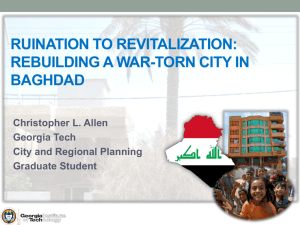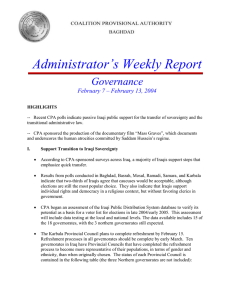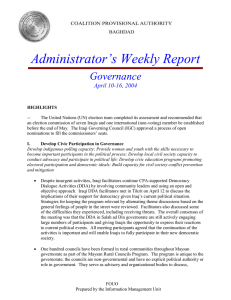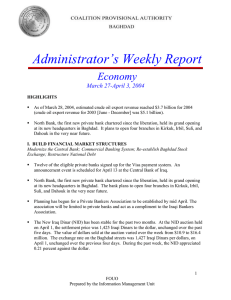Administrator’s Weekly Report Governance January 31 – February 6, 2004
advertisement
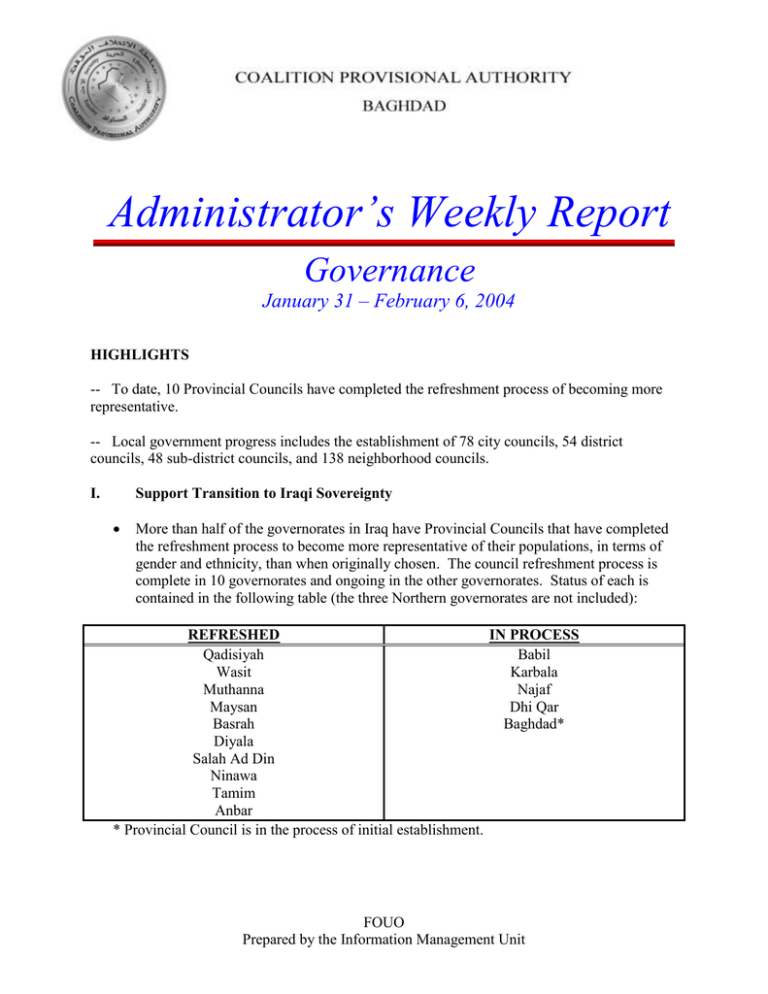
Administrator’s Weekly Report Governance January 31 – February 6, 2004 HIGHLIGHTS -- To date, 10 Provincial Councils have completed the refreshment process of becoming more representative. -- Local government progress includes the establishment of 78 city councils, 54 district councils, 48 sub-district councils, and 138 neighborhood councils. I. Support Transition to Iraqi Sovereignty More than half of the governorates in Iraq have Provincial Councils that have completed the refreshment process to become more representative of their populations, in terms of gender and ethnicity, than when originally chosen. The council refreshment process is complete in 10 governorates and ongoing in the other governorates. Status of each is contained in the following table (the three Northern governorates are not included): REFRESHED IN PROCESS Qadisiyah Babil Wasit Karbala Muthanna Najaf Maysan Dhi Qar Basrah Baghdad* Diyala Salah Ad Din Ninawa Tamim Anbar * Provincial Council is in the process of initial establishment. FOUO Prepared by the Information Management Unit II. Develop Civic Participation in Governance Develop indigenous polling capacity; Provide women and youth with the skills necessary to become important participants in the political process; Develop local civil society capacity to conduct advocacy and participate in political life; Develop civic education programs promoting electoral participation and democratic ideals; Build capacity for civil society conflict prevention and mitigation The design of the first public information materials promoting democratic themes is complete. Coalition Forces (CF) and CPA, through the USAID Local Governance Program (LGP), will disseminate this set of 1 million leaflets and 40,000 posters in all 18 governorates. In addition, five non-governmental organizations (NGOs) have received USAID Office of Transition Initiative grants to assist with distribution to critical audiences in Baghdad and throughout the country. The long-term plan for achieving indigenous polling capability is proceeding. Two sustainable polling organizations are operating: the Iraqi Center for Research and Strategic Studies (ICRSS) and the Independent Institute for Administration and Society. Deputy Secretary of Defense Wolfowitz met with female Iraqi leaders in Baghdad on February 1, for a discussion focused on the fair representation of women in emerging democratic structures. They also discussed Resolution 137, which was put forward by the Iraqi Governing Council (IGC) stating that Islamic laws are to be applied to marriagerelated issues. The meeting included Songul Chappok and Dr Salama Khafaji (IGC members), Maysoon al-Damluji, Deputy Minister for Culture, Mishkat Moumin of the Iraq Foundation, Dr. Lina Abood of Iraqi Women’s League, and Shatha Hadi Mohammed Alobiadi of the Baghdad Provincial Council Advisory Committee. The Iraqi Women in Local Governance Group has been established in response to the challenge of under-representation of women in political processes across Iraq. In January 2004, women in three governorates - Babil, Al Quadisiyah, and Baghdad - attended women’s issues conferences, including a January 29, event featuring U.S. Secretary of Labor Chao. A women’s conference is scheduled in Tamim governorate in midFebruary. The Community Action Program (CAP) established 664 Community Action Groups in 16 governorates to enable and encourage Iraqis to address critical local needs. CPA committed $44 million for 1,317 community projects across Iraq and provided $12 million in technical assistance. Participants have completed more than 666 projects. Iraqi communities have contributed approximately 25 percent of total project funding. By region, this progress includes: North: 122 completed projects and 140 in development South Central Region: 122 completed projects and 188 in development Baghdad: 183 completed projects and 142 established community action groups, with a special emphasis on income generation FOUO Prepared by the Information Management Unit South, 239 completed projects through 138 community action groups, which include approximately 40 percent female membership Three hundred and seventy youth have signed a pledge to join the Kirkuk Youth Forum in Tamim Governorate, although the activities will not be limited to members only. The multi-ethnic and non-political organization created in November 2003 focuses on youth aged 12-20. Arabs, Kurds and Turkmen comprise the managing committee. III. Develop Framework and Capacity for Elections Support creation of National Independent Electoral Commission; Promote Scopes of work and Operational Linkages between national, regional, and local level election administration authorities Technical and resource planning continues for the implementation of caucuses or other means, such as direct elections, to establish a Transitional National Assembly (TNA) by July 1. CPA and the Coalition Joint Task Force (CJTF-7) discussed contingency timelines to ensure appropriate allocation of logistical capacities, human resources and security. IV. Support Development of Sustainable Political Parties / Associations Support Development of Political Associations The National Endowment for Democracy (NED) awarded grants to the International Republican Institute (IRI) and the National Democratic Institute (NDI) to develop a political party building program. The NED will continue to develop their offices, design training programs and plan for other assistance in promoting sustainable political associations. V. Promote Respect for Human Rights Educate on Human Rights Issues; Preserve documentation of past atrocities, raise awareness, and promote reconciliation; Strengthen local capacity to investigate and address past atrocities; Iraqi Special Tribunal (IST) for past atrocities and Iraq Property Claims Commission for property disputes; Human Rights Incorporated into Laws; Develop Role of Independent Human Rights NGOs and Media; Establish a Human Rights Ministry CPA has collected over 700 summaries of past abuse and developed a database to catalog these documents. CPA completed training for Ministry personnel on documentation and conducting memorials. A documents stakeholder meeting is scheduled for mid-February. CPA supported the IGC in drafting the IST statute and continues to assist in establishing and launching IST. In addition, the Ministry received two proposals for mass grave memorials. The Iraqi Property Claims Commission (IPCC) for property disputes will open its first office, in Baghdad, February 15. FOUO Prepared by the Information Management Unit The Human Rights Ministry has assisted in the development of approximately ten indigenous human rights NGOs. VI. Develop More Accountable and Responsive Local Government Support Organization of Citizens’ Advisory Councils per CPA models, with follow on training in democratic practices, and/or support for interim representative bodies; Develop more accountable and responsive local government; Work with civic groups to encourage participation in local public affairs; Provide basic training for professional budget preparation and transparent financial management; The Local Governance Program (LGP) teamed with ICRSS to conduct a survey from October-November 2003, to solicit Iraqi opinion on issues related to local governance. Among the results in the local governance section is the relatively low percentage of respondents who stated that there were neighborhood councils, district councils, subdistrict councils, and governorate councils (see chart below). This survey was conducted to obtain a baseline of opinion in post-Ba’athist Iraq and to set targets for LGP objectives. Participatory Democratic Local Governance Process (P-IR-1 : P-IR-2) Councils in your community Efforts are being made to establish local governments in Iraq. As an initial step, a number of local advisory councils are being setup across the country. Please answer the following questions, to the best of your knowledge, regarding the councils in your community under new initiative. Yes, 42.4 No, 32.7 Don't Know, 25.5 Is there a neighborhood council in your community? Yes, 39.6 No, 32.5 Don't Know, 27.9 Is there a district council in your district? Yes, 48 No, 23.5 Don't Know, 28.5 Is there a city council in your city? Yes, 59.7 No, 16.2 Is there a governorate council in your governorate Don't Know, 24.1 Yes, 67.3 No, 32.7 Do you know the name of your local “mukhtar”? Yes, 49.2 No, 60.8 Do you know the name of the local governor/mayor? 0 10 20 30 40 50 Percent 60 70 80 90 100 LGP organized a workshop on “Management Accounting and Reporting for Efficient and Effective Service Delivery” for 38 section service heads, accountants, and audit staff of three Karbala municipalities and sewerage departments. The workshop leaders presented practical examples of various reports and performance indicators that could be developed and used by these departments. Through the implementation of local governance activities in all 18 governorates, more FOUO Prepared by the Information Management Unit than 19 million Iraqis are engaging in local policy discourse through local government entities and civil society organizations. In addition, established local councils include 78 city councils, 54 district councils, 48 sub-district councils, and 138 neighborhood councils. The first in a series of LGP workshops on development and democracy was held on January 25 in Najaf. Thirty-five representatives from local human rights associations participated in the workshop titled "Constitutional Democracy: Rebuilding Society in a Democratic Age." The participants were interested in learning about types of government, especially those in the United States and United Kingdom, and in possible political alternatives for Iraq. VII. Promote Durable Solutions for Refugees and Internally Displaced Persons (IDPs) Facilitate the Return of Refugees and IDPs; Build Local and National Capacity to Protect and assist Refugees and IDPs; Develop and Implement a Process to Resolve Property Disputes Refugee returns continue. Returns from Iran average 600 persons per week as interest in organized returns increases. Of the original 6,000 refugees in Saudi Arabia, 600 persons remain in Saudi Arabia, but are expected to return by April. Movements of people in the North have stabilized due to colder weather, but the IDP and returnee population to Kirkuk is increasing. One estimate of the current Kirkuk IDP population is 26,000, with new arrivals settling in a haphazard tent location on the outskirts of the city. The most recent arrivals cite the capture of Saddam Hussein as their reason for returning now. The Iraq Property Claims Commission (IPCC) will continue to open offices in every governorate in Iraq. A top priority is initiating public information campaigns to educate and manage expectations. In the North where populations were asked to ‘stay put’ until a property resolution mechanism is in place, expectations are that the IPCC will address a broad range of compensation issues and not simply restitution of property illegally expropriated by the former regime. The Ministry of Displacement and Migration and the United Nations High Commission on Refugees will co-host a planning meeting in Amman, Jordan on February 15-16. This meeting will allow leaders in refugee and displaced persons issues in Iraq to create a strategy to address the immediate and long-term issues for the Ministry. FOUO Prepared by the Information Management Unit
